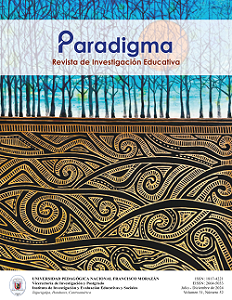On peace. A decalogue of guiding principles for building spaces for peaceful, harmonious and inclusive coexistence
DOI:
https://doi.org/10.5377/paradigma.v31i52.19502Keywords:
social justice, equal participation, positive interrelation, critical tolerance, human rightsAbstract
As a result of a documentary review with a qualitative approach, the objective of this research was integrating theoretical, epistemic, strategic and practical positions regarding peace, understood as universal value that combines solidarity, fraternal encounter and critical tolerance, when operationalized, expand the possibilities of human conviviality; additionally, a decalogue of guiding principles for building spaces for conviviality within the framework of pacifism and inclusion is proposed; then, an attempt is made to answer the question: why educate for peace?. The results indicate that community life requires common efforts around positive conflict management through fruitful dialogue, symmetrical communication and deep understanding that in turn motivate the construction of functional and respectful relationships. It is concluded that peace is the result of negotiation, agreement and reconciliation between human beings who, conscious of rational operation and within the framework of universal morality, decide to adjust their conduct to the parameters of active civility that seeks to resolve differences and disagreements through fruitful, symmetrical and conditioned dialogue.
Downloads
210
Downloads
Published
How to Cite
Issue
Section
License
Copyright (c) 2024 Universidad Pedagógica Nacional Francisco Morazán

This work is licensed under a Creative Commons Attribution-NonCommercial-NoDerivatives 4.0 International License.
Transfer of Copyright
- The author, when sending the work, states that it is his will to give the Universidad Pedagógica Nacional Francisco Morazán the patrimonial rights that correspond to him as the author of his work.
- The rights here assigned include all economic rights (Reproduction, transformation, public communication and distribution) and are given without limitation in terms of territory; This Assignment is given for the entire duration term established in the current legislation in Honduras.
- The cession of the aforementioned rights does not imply the cession of moral rights over it, because in accordance with the provisions of the Copyright and Related Rights Law, Chapter II, of the Moral Rights, Article 34, Article 25 , these rights are inalienable, imprescriptible, indefeasible and inalienable.
- The research work or document must be original and have been done without violating or usurping rights of third parties, therefore, the work is exclusively authored and owns the same.
- In the case of any claim or action by a third party, as to copyright on the work in question, the author must assume full responsibility for the rights assigned.
- Upon completion of the Rights Assignment Form, the author states that the work has not been published in another way, that the rights on the work have not been assigned and that no encumbrance or limitation on their use or use is imposed on them.





